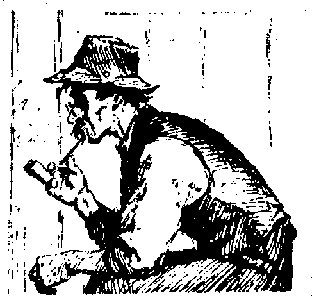
The Curmudgeon
It was obvious that Christmas was coming to the old general store because Cityfella (who, with his wife, had fled Atlanta for the holidays) was helping Storekeep arrange a dozen or so six-foot-high Frasier firs that were there with an option for sale from Farmer Stone’s small tree farm just up the road.
“Coffee’s on,” sang the choir-soprano tones of Mrs. Storekeep, who had arranged everybody’s cups on a small table in front of the now-empty block of post-office boxes that stood in the corner next to the door that lead upstairs to the small apartment that now was in the hands of Potter. Potter, who was building a new kiln just up the road that was close to being finished but still lacked the kiln-door; that was on special order from a firm out near Black Mountain.
I should mention that the boxes dated from the time the store was a post office for the community but had ceased to be used when the customers who held the boxes were moved to a system of outdoor delivery boxes in front of each driveway.
Cityfella picked up a turpentine-soaked rag and cleaned his fingers of tree sap and Storekeep did the same. They pushed the last few trees aside and went up the steps to meet the Little Debby salesman coming down the steps with an armload of stale goods.
“I’ll be right back for coffee,” he said in haste.
As the two men entered the store, they heard the dulcet tones of Curmudgeon’s old Ford pickup. Slamming the truck door, he joined them, crushing their way through the front door where they bumped into Potter. Potter, who along with Curmudgeon, picked up a copy of the local paper now stacked on top of the radiator next to the door frame.
“Have you all seen this!” yelled Curmudgeon at the top of his voice. “I’ve read the latest news relating to our mountain home and the fact that one of the local Christmas charities that runs a project for Samaritan’s Purse is a group of church-folk who have refused donations of any Harry Potter books so the unholy text doesn’t indoctrinate our young people–”
“It’s always to protect the poor children,” said Mrs. Storekeep.
“–with good opinions of witchcraft!” said Curmudgeon. He continued with, “And remember, I have heard of no major attack on the moral foundations of our great nation led by witches and warlocks who flew over the Big Pond on the backs of white owls, to destroy our heritage!”
“And,” added the Little Debbie salesman, “my nephew has been reading Marvel Comics since he learned how to spell ‘anti-gravity,’ and some of their comics are now posted on the No-No list because Iceman has been identified as gay! It’s all supposed to be a plot to force our young people into taking a so-called brutal pathway to adulthood!”
“Obviously,” said Cityfella, “it has nothing to do with taking money from the schools and teachers to give Reagan-like tax-breaks to the already wealthy in an attempt to cajole rich folks into starting new businesses and hiring more workers?”
“Where?” asked Curmudgeon.
“Where what?” asked the Potter.
“What rich folks?” asked Storekeep.
“Which Reagan?” asked the Postman, who was coming in the door with a package for Mrs. Storekeep.
“Ronald Reagan,” said Curmudgeon. “Remember, the man who brought us ‘Death Valley Days’ sponsored by 20-Mule-Team Borax. And, I think he’s the man who said: ‘The most terrifying words in the English language are: I’m from the government and I’m here to help.’”
“How would he know?” asked Cityfella. “He was earning big bucks as a radio and movie star.”
“Was he involved with a closet?” asked Potter, who was a bit younger than the rest of the good old souls in the store.
“No,” said Mrs. Storekeep, “that was Fibber McGee and the hall closet so stuffed with junk that when opened the door, the sound effects man for the program had to use everything at his command to make an incredible noise of falling golf clubs, football helmets, bowling balls, and the like.”
“He also said ‘America is too great for small dreams,’” said the Little Debby Man.
“Tell that to everybody who lost their homes and their retirement in the last recession.”
Nobody could top that!
Peter Loewer has written and illustrated more than twenty-five books on natural history over the past thirty years.
